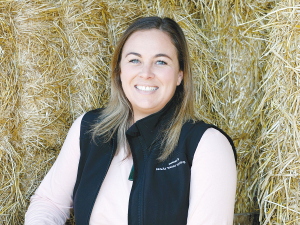DairyNZ opens applications for associate director role
DairyNZ is giving New Zealand farmers a unique opportunity to gain hands-on governance and leadership experience within the dairy sector.
 Canterbury sharemilker Ash-Leigh Campbell believes the time is right for young Kiwis to join the dairy industry and become part of the success story.
Canterbury sharemilker Ash-Leigh Campbell believes the time is right for young Kiwis to join the dairy industry and become part of the success story.
The dairy industry is urgently looking to attract more people to meet a shortage of 2,500 staff on farms, according to DairyNZ.
And Canterbury sharemilker Ash-Leigh Campbell believes the time is right for young Kiwis to join the dairy industry and become part of the success story.
The dairy sector is keen on greater diversity in its workforce and 32-year-old Ash-Leigh, an urban Māori, is a great role model.
She and her business partner own 'Partners in Cream' - a sharemilking business.
She has served in governance roles and has won several awards including being the youngest ever winner of the prestigious Fonterra Dairy Woman of the Year award in 2020.
In 2021, she completed a three-year term as chair of New Zealand Young Farmers and in the same year was one of four businesswomen to win an emerging director award from the Institute of Directors (IoD) Canterbury Branch.
Ash-Leigh's first brush with the dairy industry came when she was in Lincoln High School in Christchurch.
"It was by complete accident," she says.
"When I was in high school, I relieved milk for a local farmer milking 200 of his pedigree Holstein Friesian cows, three times a week after school and it snowballed from that.
"My parents purchased me my first runabout vehicle, and if I wanted to drive it, I needed a job to pay for fuel, registration and other expenses."
So she turned to sharemilking.
Ash-Leigh says the farmer was shocked to see a female - as Ash-Leigh is also a male's name - rock up for the interview, which was for milking the cows and hosing down the yards afterwards.
"He stated he wouldn't be offended if I didn't want the job. I said 'no issues, see you tomorrow'."
Ash-Leigh says she learnt on the job and points out that in the agri-sector "you can earn while you learn".
"In the trade space you may be on a lower wage while you're doing your apprenticeship but you're learning and getting a qualification at the same time.
"That's a really viable pathway here in the dairy sector as well. That's exactly how I did it, completing Primary ITO papers at the same time as dairy farming. Going in at the base level, putting those two things in together - working and learning."
Like all newcomers, Ash-Leigh says she started from the very bottom, learning how to milk a cow, and hose down a yard efficiently and effectively on day on and from there slowly built up her confidence.
Milking cows after school for a few years was enough for her at the time, as farming also wasn't sold as a career by high school careers advisor.
"So, I was blissfully ignorant I could turn what I enjoyed doing - being with the animals and working outdoors - into a career I am passionate about.
"I'm a big believer in continuous learning. You can stop when you want, and pick things up again when you want, which is what I have done.
"I hd made moves and progress when the time felt right, and when I was feeling hungry for my next challenge."
Being from an urban background has never bothered her and she hopes that others aren't put off by having an urban background.
"If anything, give it a go, if you don't enjoy it, at least you gave it a shot! You may also find that you can support the dairy farming sector in different ways."
Being a young Māori female in dairy was a hurdle earlier on but doesn't bother Ash-Leigh now.
"The hurdle for me personally in this sector, would have to be early on being a young wahine.
"Now it doesn't bother me. Wherever and whenever I can mentor or encourage other young women I do so."
Ash-Leigh's advice to young Kiwis is to give dairying a go and seek good employers.
"If we an contribute to telling that story and working to create more environmentally friendly products, great products with high food safety for the international consumer, while looking after our own backyard and our own Kiwi customers. Why wouldn't you want to be a part of the change?"
The World Wide Sires National All Day Breeds Best Youth Camp Best All Rounder plaudit has become family affair, with 2026 Paramount Cup winner Holly Williams following in her sister Zara's footsteps.
DairyNZ is giving New Zealand farmers a unique opportunity to gain hands-on governance and leadership experience within the dairy sector.
Herd improvement company LIC has posted a 5.2% lift in half-year revenue, thanks to increasing demand for genetics.
According to the latest Fresh Produce Trend Report from United Fresh, 2026 will be a year where fruit and vegetables are shaped by cost pressures, rapid digital adoption, and a renewed focus on wellbeing at home.
The Roar is a highlight of the game hunting calendar in New Zealand, with thousands of hunters set to head for the hills to hunt male stags during March and April.
OPINION: The past few weeks have been tough on farms across the North Island: floods and storms have caused damage and disruption to families and businesses.
OPINION: Fonterra may be on the verge of selling its consumer business in New Zealand, but the co-operative is not…
OPINION: What does the birth rate in China have to do with stock trading? Just ask a2 Milk Company.